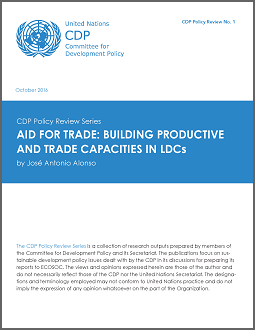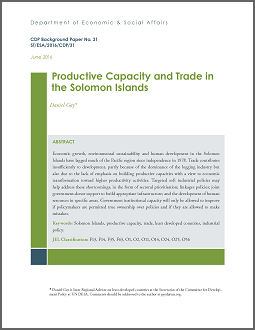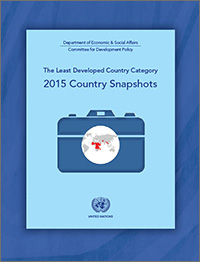Document_CDP: CDP Publications
CDP Publications
22 October 2016
CDP Policy Review No. 1 By José Antonio Alonso The paper looks into the origins of Aid for Trade (AfT) and its objective of assisting developing countries to increase exports of goods and services and integrate into the multilateral trading system. Poi ...
11 July 2016
This paper attempts to identify different LDC clusters in which underdevelopment is caused by specific economic and social conditions.
30 June 2016
This paper aims to draw insights from New Structural Economics by applying the Growth Identification and Facilitation Framework (GIFF) to LDCs with a special focus on the case of Uganda.
20 June 2016
The paper examines economic growth, environmental sustainability and human development in the Solomon Islands.
21 April 2016
This paper identifies critical institutional constraints regarding the use of support measures in Uganda.
19 November 2015
The second edition of the Handbook on the Least Developed Country Category: Inclusion, Graduation and Special Support Measures (2015) provides comprehensive information on the least developed country (LDC) category, including a description of procedures and methodologies used in the identification of these countries, and the support measures associated with it. It builds upon and updates the previous edition published in 2008. Accordingly, the LDC Handbook is intended for the use by government officials, policymakers, researchers and others interested in the particular development problems and challenges faced by the most disadvantaged developing countries.
19 November 2015
The Committee for Development Policy (CDP) launched today the second edition of the Handbook on the Least Developed Country Category: Inclusion, Graduation and Special Support Measures at a briefing in New York. The Handbook contains a detailed description of the procedures and methodologies used by the CDP in the identification of least developed countries (LDCs), as well as an overview of the international support measures associated with the LDC category. As a supplement to the Handbook, the LDC 2015 Country Snapshots was also presented at the briefing. The Country Snapshots is a compilation of one-page profiles for each of the 48 countries classified as LDCs in 2015 and illustrates the gaps in progress towards the LDC graduation thresholds for each country.
12 November 2015
This paper argues for the strengthening of the Committee on World Food Security to ensure greater coherence in the global approach to food security and the multilateral trade, financial and environmental regimes.
21 September 2015
Global Governance and Rules for the Post-2015 Era provides a unique assessment of global rules and governance; a reflection of how global rules have been shaping development experiences and outcomes; an identification of the shortcomings; and in ...










Follow Us